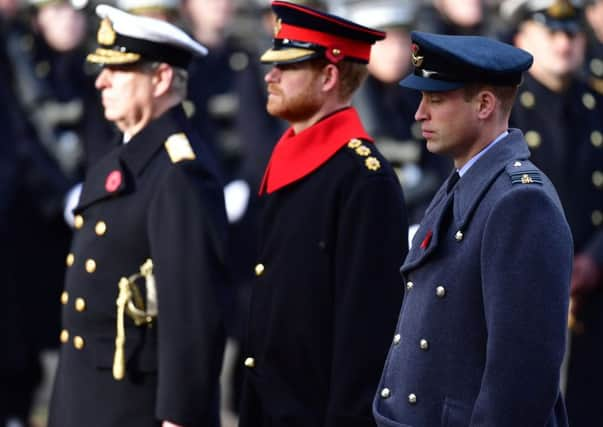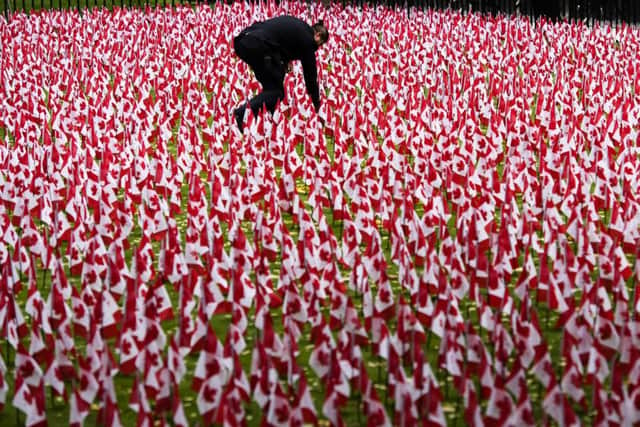William Wallace: The myth that we stood alone in both world wars is embedded in our national narrative '“ and it is wrong


I recall seeing an early memorandum to the then Prime Minister in 2012 which stated that, in our approach to the commemoration of the First World War, we should ensure that we did not give support to the myth that European integration was the outcome of the two world wars.
The Government’s stated purposes in their approach to the commemoration of the centenary were youth and education. We achieved that aim in engaging our younger generations to discover the histories of their local communities in war and the impact of the loss of life on families throughout Britain.
Advertisement
Hide AdAdvertisement
Hide AdWe have done very well in symbolising reconciliation with Germany, but we have failed in educating our younger generation about the wider context of the war and the extent to which British forces depended on the contribution of allies and imperial troops.


I recall entering a book shop in the Yorkshire Dales two or three years ago – as well stocked with volumes on the two world wars as on steam trains and Yorkshire traditions – to find the owner arguing with a visitor about Brexit. He was saying: “After all, we beat the Germans in two world wars and now they are telling us what to do.”
Advertisement
Hide AdAdvertisement
Hide AdThat echoes one of the widely held myths of British history, propounded by Margaret Thatcher among others, that Britain stood alone in two world wars. I tentatively suggested that we had had a lot of help from others in both wars, most of all from the Americans. I was told that, so far as he knew, the Americans had not taken part in the First World War.
It is not that surprising that few Britons appreciate the importance of the American contribution. In spite of proposals that we should make a major event of the US entry into the war, the only significant commemorative event took place on the Scottish island of Islay earlier this year.
In contrast to the welcome gestures of reconciliation to our former German enemies, we have also neglected the contributions of our allies and imperial forces. We have not recalled that elements of the Belgian army held part of the Ypres salient throughout the First World War, using England as their support and supply base. We have missed a great opportunity to contribute to national integration and to encourage more from our Asian and other ethnic minorities to enlist in our forces today. We have failed to explain how closely our history is linked to our continental neighbours.
The remembrance ceremony at the Cenotaph is, in effect, the annual symbolic representation of British history and identity. In 1919, the first parade past the Cenotaph included troops from 12 empire and allied forces – the French, Americans and others – as well as from Britain. Since then, however, it has shrunk to an entirely British ceremony, unchanged for over half a century and almost entirely white, with only the Commonwealth high commissioners from outside the UK. I welcome the participation of the German president in this year’s event as a welcome sign of openness to change.
Advertisement
Hide AdAdvertisement
Hide AdShould we not in future years follow the French example in their July 14 ceremonies and invite contingents from other countries, with whom we have shared – and still share – common dangers and threats to take part? This could include contingents from India and Pakistan, to mark how much Britain depended on their predecessors in past conflicts; Polish troops and airmen, to explain to our young people the crucial contributions that they made in the Second World War in intelligence, in the Battle of Britain, at Arnhem and Monte Cassino; and Belgian forces, to make our right-wing politicians recognise that many Belgians fought on, from British bases, in both world wars.
When in Government, I recall a Conservative Minister remarking that the Belgians never fight, to be sharply corrected by an official who reminded him that Belgian and British planes were flying joint missions over Libya at that time. Britain did not stand alone in either world war. The myth that we did is embedded in our most widespread national narrative, and in the way we have approached commemoration of the sacrifices in the two wars.
As such, I hope that we will learn lessons for a more inclusive approach in the future: a recognition that Britain’s security has been maintained with the support of others, and will be maintained in the future only if we continue to co-operate with others within an institutionalised European and international order.
Lord Wallace of Saltaire is a Lib Dem peer. He spoke in a House of Lords debate on the Armistice – this is an edited version.